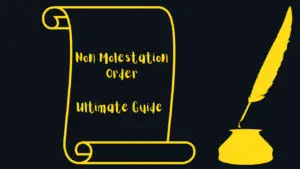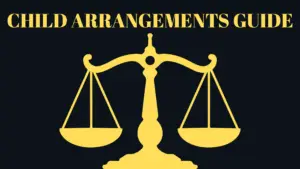How the Family Court Handles Domestic Abuse Allegations: A Father’s Guide
“Last Updated” Date: Sunday, 12 October 2025
An allegation of domestic abuse in the family court is one of the most serious and terrifying situations a father can face. The moment these words are used, the entire dynamic of your case shifts. I have supported many fathers through this, and I know you may feel that I have been subjected to significant emotional discomfort, as it can seem like you are instantly presumed to be a risk to your children, your relationship with them hanging by a thread based on allegations you know are untrue.
Your instinct may be to get angry and defensive. This is a mistake. The court has a very specific and formal process for dealing with allegations of domestic abuse, and your only path forward is to engage with that process calmly and strategically. This guide will explain how the court treats these allegations, what it means for your child contact under the critical court rulebook of Practice Direction 12J, and how you can navigate the process to ensure a fair hearing.
Key Takeaways
- The Court Takes All Allegations Seriously: The immediate priority of the court and CAFCASS will be to assess any potential risk of harm to the child. Your case becomes a safeguarding case first and foremost.
- The Definition of Domestic Abuse is Broad: It is not just physical violence. The court considers controlling or coercive behaviour, emotional, psychological, and financial abuse as equally serious.
- A “Fact-Finding Hearing” May Be Needed: If you deny the allegations, and they are relevant to the child’s welfare, the court may hold a separate hearing to decide what, if anything, happened before making long-term decisions.
- Contact May Be Supervised Initially: The court’s starting point will be to ensure contact is safe. This often means contact will initially be supervised at a contact centre while investigations are ongoing.
Allegations can feel overwhelming — message us on WhatsApp today to get clear, calm guidance.
Jump To
- A Deep Dive: Practice Direction 12J – The Court’s Rulebook
- Your Strategic Path: Responding to the Allegations
- At a Glance: Supervised vs. Unsupervised Contact
- Common Mistakes Fathers Make When Falsely Accused
- FAQs: Domestic Abuse Allegations & Child Contact
As a former Cafcass and Children’s Services social worker, I can tell you that a fact-based, child-focused approach is essential when domestic abuse is alleged. A judge and CAFCASS officer are not trying to trip you up; they are trying to establish the facts to make a safe decision for a child. A father who understands this, who stays calm and provides clear factual evidence, is the one who gives the judge the tools they need to see through the allegations.
A Deep Dive: Practice Direction 12J – The Court’s Rulebook
Practice Direction 12J
This is the single most important piece of legal guidance in cases involving domestic abuse. Practice Direction 12J of the Family Procedure Rules is the formal rulebook that judges, magistrates, and CAFCASS officers must follow.
What This Means For You: Your entire case will be viewed through the lens of this document. It mandates that the court’s primary consideration is the safety and well-being of the child and the parent who is the alleged victim.
Fact-Finding Hearing
PD12J directs that where serious allegations of abuse are made and disputed, the court must consider a fact-finding hearing to decide whether they are true. This is a separate hearing from the main child arrangements case.
What This Means For You: This is your opportunity to formally challenge the allegations. You will need to provide a detailed witness statement and evidence to rebut the claims made against you. The outcome of this hearing will have a massive impact on your child contact case.
Example: Snippet from a Position Statement Responding to Allegations
I have read the allegations of domestic abuse made by the Applicant in her C100 application. These allegations are denied in their entirety.
There has never been any domestic abuse within our relationship. The police have never been called to our address in relation to domestic abuse, and there has been no involvement from Children’s Services.
I believe these allegations have been made to frustrate my relationship with our child, following our separation. I am willing to engage with any court process, including a fact-finding hearing, to establish the truth.
My primary concern is to re-establish a safe and consistent routine of contact with our child as soon as possible, even if the court deems that should be in a supervised setting initially while it investigates.
A Real Life Scenario: A mother alleges a pattern of controlling behaviour. The father denies this. At the first hearing, the judge refers to PD12J and states that because the allegations are relevant to the child’s welfare, they must be investigated. The judge lists the case for a fact-finding hearing and, in the meantime, makes an order for the father to have supervised contact with his child at a contact centre, pending the outcome of that hearing.
Your Strategic Path: Responding to the Allegations
When allegations of domestic abuse are made in a C100 application, it triggers a specific chain of events. Your response must be calm and procedural.
- Acknowledge the Process: Understand that CAFCASS will conduct safeguarding checks first. They will speak to you and the mother and run checks with the police and Children’s Services. Their initial safeguarding letter to the court will highlight these allegations as a priority.
- Draft a Factual Position Statement: Before the first hearing, you must write a Position Statement. In this document, you must clearly and calmly deny the allegations. State facts, not emotions. For example, “The allegation at paragraph 5 is denied. I was at work on that day, as shown by my timesheet at Exhibit A.”
- Engage Calmly at the First Hearing: At the first hearing, the judge will consider the allegations. If you deny them, the judge has to decide if they are serious enough to require a fact-finding hearing. Your calm and respectful demeanour in court is critical.
- Prepare for a Fact-Finding Hearing: If a fact-finding hearing is listed, you will need to prepare a detailed witness statement responding to each allegation in turn, attaching any evidence you have to support your case.
At a Glance: Supervised vs. Unsupervised Contact
When domestic abuse is alleged, the court’s immediate concern is safety. This often means a temporary change in how you see your child.
| Feature | Supervised Contact | Unsupervised Contact |
|---|---|---|
| Goal | ✅ To ensure the child is safe during contact while allegations are investigated and assessed. | ❌ To allow for a normal, natural parent-child relationship where no significant risk has been identified or proven. |
| When to Use It | As an interim measure when serious allegations have been made but not yet proven. | When there are no safeguarding concerns, or after a period of positive supervised contact reports. |
| Example | Two hours every Saturday at a registered contact centre, monitored by staff. | Overnight stays at your home every other weekend. |
| Legal Test | Is there a risk of harm that requires monitoring to make contact safe for the child? | The court presumes parental involvement is in the child’s best interests, and there is no evidence to displace this. |
| Outcome | ✅ Contact is maintained safely. Positive reports can be used to argue for a move to unsupervised contact. | ❌ The normal, beneficial parent-child relationship continues. |
Worried about supervised contact? We can help you build a plan to move towards unsupervised time. Message us today.
Common Mistakes Fathers Make When Falsely Accused
When I was writing Section 7 reports, I often saw fathers’ cases damaged by their own reactions to false allegations. The court is a formal environment, and emotional outbursts are seen as evidence of risk.
Common Pitfalls:
- Responding with Anger: Why this is a mistake: An angry, aggressive response in writing or in court will be seen as potential evidence that the allegations against you have merit. You must remain calm.
- Breaching Any Interim Orders: Why this is a mistake: If a non-molestation order or an order for no contact is made, breaching it is a catastrophic mistake that can have criminal consequences and will destroy your family court case.
- Focusing on the Adult Relationship: Why this is a mistake: Your defence must be focused on your relationship with your child and why you are not a risk *to them*, not on re-running the arguments of your romantic relationship.
FAQs: Domestic Abuse Allegations & Child Contact
Fathers facing these allegations often have these urgent questions.
Will I automatically lose contact with my children if I’m accused of domestic abuse?
Not automatically, but the court will act with extreme caution. Your contact will likely be restricted (e.g., supervised or indirect) while the allegations are investigated. A finding of abuse does not necessarily mean no contact, but it makes achieving unsupervised contact very difficult.
How can I prove the allegations are false?
You must provide a clear and factual rebuttal in your written witness statement, supported by evidence where possible. This can include text messages, emails, or statements from third parties that contradict the allegations. The court will likely hold a fact-finding hearing to decide the truth.
What is a fact-finding hearing?
A fact-finding hearing is a type of mini-trial where a judge will hear evidence from both parents, and sometimes other witnesses, to decide whether the specific allegations of domestic abuse are true or not, on the balance of probabilities.
Will a finding of domestic abuse be on my criminal record?
No. A finding of fact in a family court is a civil matter and does not give you a criminal record. However, it is a formal judgment by the court that can have a serious and long-lasting impact on your relationship with your children.
Does the court only care about physical abuse?
No. The court and CAFCASS consider all forms of abuse, including emotional, psychological, coercive and controlling behaviour, and financial abuse, to be very serious and potentially harmful to children under Practice Direction 12J.
Build Your Strongest Defence
At Dads Consultancy, we provide the specialised, expert support to move you from crisis to control. We can help you with:
- Responding to Non-Molestation Orders
- Drafting Powerful Position Statements
- Making Your Application (C100)
- Handling the CAFCASS Call
- Navigating Section 7 Reports
- McKenzie Friend Support
- MIAM/Mediation Guidance
- Navigating Child Arrangements Orders
An allegation is not a conviction. The family court process is your opportunity to be heard. WhatsApp us today for a strategic consultation, and let’s build a clear plan to ensure you get a fair hearing.
🧠 Insider Insight: Lach, our founder, is a former Cafcass and Children’s Services Social Worker. He has been on the inside of the family court system, writing the very reports that influence court outcomes. Now he uses that insider knowledge to help dads navigate the process effectively. Learn more about Lach’s background.




